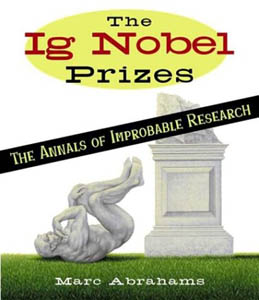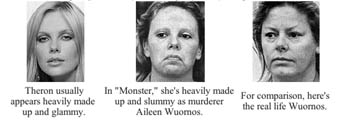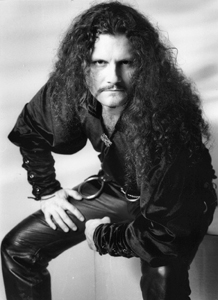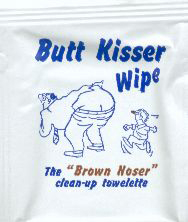![[Metroactive Features]](/features/gifs/feat468.gif)
[ Features Index | Silicon Valley | Metroactive Home | Archives ]
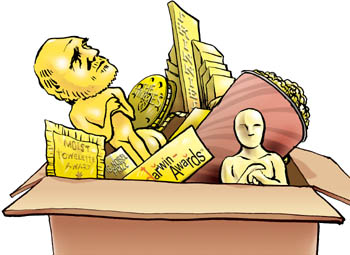
The Alties We announce top honors for the year's most non-Oscar-like award shows AT LONG LAST, 2003 has run its weary course, and we calendar keepers are now officially burning through the early weeks of a new year. This can mean only one thing: That magical time of the year, award season, is upon us. Two weeks ago, it was the Golden Globes, in which we learned a fantasy-adventure movie like The Lord of the Rings: The Return of the King is indeed able to take home best director, best dramatic picture and other top prizes. The Hollywood Foreign Press has been handing out the Globes for almost as long (61 years!) as the Oscars have been around. Until recently, the Globes suffered under a reputation as an anemic imitation of the Oscars. Nowadays, they're thought of as a pre-Academy litmus test, though more laid-back than the dour Oscar ceremony, because drunk and disorderly celebrities sometimes say wonderfully embarrassing things. But the Globes are only one of a number of award shows, which, at this point, can be divided into those that have already nominated and presented awards, and those still yet to come. A list of the former includes the National Board of Review, the Southeastern Film Critics, the Producers Guild of America, the British Academy of Film and Television and film critics in Boston, San Francisco, Washington, Toronto, San Diego, Seattle, Florida and Kansas City. Award shows yet to come, beginning this weekend with the Directors Guild of America, are the American Society of Cinematographers, American Cinema Editors, Visual Effects Society, Writers Guild of America, Cinema Audio Society, Screen Actors Guild and, finally, the Oscars. Oscar, bless his naked little soul, is no longer the only show in town--hasn't been for a number of years. Some say this award-show glut has cheapened the whole shebang. Oscar knows it too. This year, to avoid being the award season footnote, the show was moved up a full month earlier, to Feb. 29. Will this help? Does anyone care? There was a time, of course, when the Oscars did mean something, easily earning their reputation as the undisputed Super Bowl of the filmmaking world. As an important pop-culture event, the Academy Awards ceremony was second to none, annually ranking among the highest-rated television broadcasts and enticing stars like Cher to improbable flights of fabric-twisting fancy. They're All Winners Those days, of course, are long gone. For good or ill, we now live in award-show overload. Every profession feels strangely entitled to its own Oscar-like honoring system. From insurance sales (Product Line Solution Awards) to foundation application (Hollywood Makeup Artist and Hair Stylist Guild Awards) to prostitution (the Aspasia Awards). Such award-oriented thinking has become so integrated into our lives it's become an automatic expression of affection. Even the lowliest and least-funded among us are finding ourselves compelled to have some Oscar-like fun. Armed with little than a website and a sense of humor, hundreds of alternative award shows have popped up, some not much more than elaborate hoaxes, other possessing more serious intentions. Thankfully, these ingenious folks have been quietly co-opting the traditions and structures and parlance of awards season and are using them to satirize the system, as well as to make comments on the condition of the arts and various other issues of the wider world. Such underworld flimflammery is exciting, and unlike the average, four-hour Oscar telecast, these alternative "awards" are seldom boring. But then, many of them exist without benefit of an actual awards event, and sometimes without actual awards. Still, unlike such big-budget galas as the Oscars, some of these lesser efforts actually mean something. Many of these efforts--fluttering somewhere in that Internet neversphere between community service and personal expression--will never amount to anything. Others are sure to become as notorious as the Darwin Awards. Begun online by molecular biologist Wendy Northcutt, the Darwins are, by necessity, posthumous. They honor those who have improved the human gene pool by accidentally killing themselves in incredibly stupid ways: The Brazilian man who lit a match in a gas storage tanker to see if it was clean; the Michigan man who fell through the ice twice in 24 hours on Saginaw Bay; the English couple run over while copulating in the middle of the road. Call it addition by subtraction. Northcutt has expanded the awards into three bestselling books and has a major motion picture on the way. Surely such handcrafted effort deserves to be honored with its own awards presentation. After all, if last year's Oscars and this year's Grammys are eligible for an Emmy award (both were nominated for Best Variety or Music Special), it's only fitting that a few notable, under-the-radar award shows be similarly applauded. Here then, for your consideration, are our choices for outstanding achievement within the ever-evolving art of creative award-culture tomfoolery.
Back in the late '70s, when the Bad Cinema Society was formed, it listed just two members, Mike Lancaster and Ray Wright. Forced to usher at a Pasadena movie theater on the night of the 1978 Academy Awards, the sleep-deprived, popcorn-fed pals were inspired to start their own anti-Oscar campaign after. As attendance was typically light that evening, Lancaster and Wright smuggled in a small black-and-white TV set and watched the Oscars from the snack bar. It was the night The Deerhunter and Coming Home beat the celluloid out of Heaven Can Wait and Midnight Express. How great would it be, they joked, should the Oscars take a break from honoring the best films and begin issuing scornful demerits to the year's worst cinematic stinkers, like John Travolta and Lily Tomlin's May-December flop Moment by Moment or Peter Frampton and the Bee Gees embarrassing themselves in Sgt. Pepper's Lonely Hearts Club Band? It was too good an idea to ignore. A year later, Lancaster and Wright printed ballots, distributing them to friends and customers, then tabulating the results. With that move, the Bad Cinema Society and the annual competition known as the Ultimate Bad Cinema Awards, quickly dubbed the Stinkers, were born. "For the next few years," says Lancaster, "we kept that up, doing the ballot among ourselves, annoying all our friends. It was a labor of love. We thought every group of ushers did something like this. Thank God for the Internet, because we were finally able to take it to an international audience and leave our friends alone." Today, 25 years later, Lancaster and Wright have turned their fitful irritation with lousy films into a thriving, if still relatively unknown, movie-bashing website (www.thestinkers.com). Lancaster, who handles the site's day-to-day operation, now posts reviews of notably bad films, maintains a list of the 100 worst films of the last century and proudly links to Alternative Reel's Critical Hyperbole's Hall of Shame, where movie critics are chastised for their exclamations over such fare as Gigli. It's all about loving movies and having no patience for junk. "I just hate that the studios are always lying to us," says Lancaster. "Gigli was not the romantic comedy of the year, but they told us it was in that ad campaign. Pluto Nash was not, and will never be the 'comedy event of the decade,' but that's how they described it. The studios keep giving us crap, so they deserve all the crap we shoot back at them." Once a year, Lancaster makes ballots available in whatever way seems appropriate. (One year they passed out ballots at the Rose Parade.) Afterward, they gleefully post the results, formulating a variety of categories including Most Unwanted Sequel and Most Toxic Chemistry Between Screen Couples. No one appears to make emotional speeches because there is no Stinker ceremony. "We do send winners a certificate," Lancaster says. "If we can find a celebrity's address, we will make an effort to let them know they've won something, even if it was the award for Worst Actor of the Year." To date, the only response they received was from Tom Green, winner a few years ago for his god-awful work in Freddy Got Fingered. "We got an angry email from Tom Green's manager," Lancaster says, laughing. "He didn't think it was very funny--but then, the movie wasn't that funny either." With a modest amount of prodding, Lancaster acknowledges the existence of that other bad-movie competition, the Golden Raspberry Awards, launched in 1980. The Razzies, which garner loads of media attention every year, are the award institution to which the Stinkers are most frequently compared, though the Stinkers were technically doing their thing first. "What we do is pretty much identical to the Razzies," admits Lancaster, "except we have a much more comprehensive ballot, with funnier, better-thought-out categories. You will not find Worst Fake Accent on the Razzie ballot. You will not find Most Painfully Unfunny Comedy on their ballot. Basically," he laughs, "they're boring, and we're not." Lancaster and Wright believe that it's only a matter of time till fame catches up with them. "Give us another 10 years," says Lancaster, "and the Stinkers will have turned that other bad film award into a tiny little afterthought."
"There's one thing, I think, that clearly sets the Ig Nobels apart from all the other awards out there," explains Marc Abrahams, one of the main brains behind the annual Ig Nobel prizes and editor of the Boston-based "science humor" magazine called The Annals of Improbable Research. "All the other awards tend to honor something for either being the very, very best, or the very, very worst. With the Ig Nobel prizes, best and worst are completely irrelevant. The Ig Nobels honor just one quality--things that first make you laugh, then make you think." As described in Abrahams' new book, The Ig Nobel Prizes: The Annals of Improbable Research, the cheeky Ig Nobels are one of the oddest prize fights going, an intellectual jokefest annually staged at Harvard University. Nobel Prize holders present awards to various unsung individuals whose scientific work, to quote Abrahams, "cannot, or should not, be reproduced." In 2003, Ig Nobels were presented to 10 scientific groups, including a band of Australian physicists honored for "An Analysis of the Forces Required to Drag Sheep over Various Surfaces." Another award went to a team of English doctors who discovered the hippocampi of London taxi drivers are more highly developed than those in the brains of their fellow English citizens. The evaporation rate of foam on mugs of beer, a mathematical formula predicting how many Alabamans are going to hell and the comparative palatability of different Costa Rican tadpoles were also award winners. Now in its 14th year, the lab-coated, duck-calling, paper airplane-tossing, wild Ig Nobel ceremony has become a hot ticket in Boston. Routinely rebroadcast in an audio version on NPR the first Friday after Thanksgiving (on Ira Flatow's weekly "Science Friday" segment of Talk of the Nation),the Ig Nobels are broadcast online at www.improbable.com. In addition to the new book, a troupe of Ig Nobel winners will be touring England this spring as a kind of traveling science-comedy show. "In England," notes Abrahams with a bemused chuckle, "the Ig Nobels have become the centerpiece of National Science Week. Go figure." The exponential growth of the Ig Nobel popularity is welcome, he suggests, since it calls attention to the awards' underlying point: Science can be interesting, and at the very least, it can be funny. "What I hope the Ig Nobels accomplish, if anything," he explains, "is to get more people to become curious about those things they once thought they hated, or maybe were convinced they couldn't understand." And what are the chances the Ig Nobels may someday eclipse the Oscars and the Grammys in popularity? "Good question," Abrahams replies. "Someone should do a study on that."
Big-screen celebrity is only skin-deep, or so some people say. According to Dr. Reese Vail, a San Francisco-based dermatologist, educator and film fan, movies are all about skin. "The Lord of the Rings!" he trumpets. "The power of those three films is amazing And the skin conditions--wow! It wasn't just the evil characters who had bad skin--the orcs with their rotten complexions, Grima Wormtongue with his crazy lesions and weird moles. What was amazing was that the heroes, the regular movie-star types, all had skin conditions you could see. There's Elijah Wood floating down the river, and he has this huge zit on his chin, not erased by computer. It's there on the DVD for all eternity. "There's also Viggo Mortensen's lip scar and Liv Tyler's little chicken pox scar and Elijah Wood's finger-bitten fingernails. Those movies are packed with interesting skin conditions!" Such examples and more (a lot more) are displayed in sometimes queasy detail on Vail's uniquely focused website, Skinema.com. "It's something I started a few years ago," he explains, "as a tongue-in-cheek method of showing people the way skin conditions are used in movies and to remind people that celebrities like Cameron Diaz--even though we tend to think of them as physically perfect--actually have skin like the rest of us. Truth is, that image of Cameron Diaz is not reality. It's an airbrushed fantasy. Cameron Diaz actually has very severe adult acne." Within months of starting up the site seven years ago, Dr. Vail--who runs a private practice as well as serving on the clinical faculty at UC-San Francisco--found himself fielding calls from journalists and radio stations around the world, all wanting to talk about the doctor's favorite skin flicks. An Oscar-like effort seemed inevitable. Now, once a year, Vail selects the best examples from the previous year's films and announces winners in a contest he calls the Skinnies. This year's winners include Charlize Theron in Monster, winner for Best Use of Makeup to Uglify Rather Than Beautify. Another winner is the "dark spot on Sean Penn's neck" in Mystic River (Most Distracting Lesion). Taking the prize for Best Hidden Comeback is none other than "Demi Moore's stretch marks," as showcased in that revealing bikini scene in Charlie's Angels: Full Throttle. Vail's favorite is the award for Scariest Pierced Creatures. "The year's Scariest Pierced Creatures weren't the orcs from Lord of the Rings or the Bullseye character from Daredevil," Vail says. "They were those punctured, tongue-bar girls from Thirteen. That was the really terrifying stuff!" One of Vail's prickliest peeves is the way certain skin conditions--facial scars, albinism--signify the innate badness of a character. The worst case from 2003, he says, was the gun-toting evil albino in Anthony Minghella's Cold Mountain. "Doesn't Minghella realize that the evil albino is such a lame cliché?" Vail asks. "Why are there never any evil psoriasis characters? Filmmakers, please, just give us one evil psoriasis guy." If nothing else, it would be a shoo-in for a Skinnie.
As if Marc Abrahams wasn't busy enough with the Ig Nobels, his Annals of Improbable Research magazine recently hit another offbeat home run with the launch of the Luxuriant Flowing Hair Club for Scientists. The first Man of the Year was Dr. Piero Paravidino, a chemical researcher and heavy metal rocker from Italy, who authored the paper "Synthesis of Medium-Sized N-Heterocycles Through RCM of Fischer-type Hydrazino Carbene Complexes." For Woman of the Year, the winner was French astronomer Ilana Harrus, Ph.D., an expert in supernova X-ray emissions. As advertised, both of these winners have long, luxuriant, flowing hair. Nothing is offered winners of the flowing Hair Club except recognition by their peers. "Membership itself is sort of a trophy," says Abrahams. That hasn't stopped thousands of the world's leading scientists from writing in to nominate each other, and even themselves. "People do compete for this honor," Abrahams allows. "The letters are pretty funny. A lot of them are emphatic that it's an important honor and that they're the one who deserves it." Unlike the Ig Nobels, there is no public Luxuriant Flowing Hair Club ceremony per se, but Abrahams is happy to proclaim that British members of the Hair Club will be invited to come up onstage and take a bow when the traveling Ig Nobel show hits the United Kingdom in March. "That should be very exciting," he says. "Imagine it--all that flowing hair in one room."
The Moist Towelette Awards are the pleasantly scented brainstorm of Michael Lewis, a 28-year-old computer programmer from Orlando, Fla., who boasts a certain hard-to-describe fondness for the peculiar, factory-dampened paper product known as the moist towelette. "I just appreciate the fact that, while working in relatively confined parameters, the moist towelette artists of the world are able to express themselves in unique ways," Lewis explains. In 1995, Lewis crafted the first issue of The Modern Moist Towelette Collecting Newsletter. "I thought creating a moist towelette newsletter might make the world more interesting," he says, "so I did it and printed it up, and I mailed the first edition to a few of the major moist towelette manufacturers. But I never heard back from them." A year or so later, Lewis took the concept to the Internet (http://members.aol.com/moisttwl), where it currently exists as one of the leading moist towelette-collecting websites in cyberspace (oh yes, there are others). Almost immediately, people began sending packaged towelettes in the mail. "It was great to suddenly be receiving these moist towelette treats in my mailbox," Lewis says. "People actually took the time to send me various unusual moist towelettes they had found, and my collection suddenly exploded." He is now the proud owner of more than 2,000 such items, many of which are featured on his site, along with such inspired attractions as a moist towelette matching game, a Modern Moist Towelette Collecting theme song and the Modern Moist Towelette Collecting Gallery. It was only a matter of time until Lewis began the Modern Moist Towelette Collecting Awards, honoring the spongy thingies for Best Design in international, medical, restaurant, casino and gas station categories. Honors go out for Strangest (that would be the one advertising The Wizard of Oz on Ice) and Most Original Use. Winners include a mint-flavored, mouthwash-dampened "tooth towel" and a spiritually inclined wipe adorned with a cross and fish, emblazoned with the mailing address of a Hallandale, Fla., minister and the semidelusional words, "This is an instrument of Faith!" The awards are not annual; Lewis merely posts his favorites as the mood hits him. But as evidence of the award's significance, he proudly mentions the written response received from Zee Medical Supply, maker of a towelette once nominated in the "medical" category. "We were pleasantly surprised to find our award on your site," the letter reads, "and we will try to be gracious about missing out on the top spot. Just being nominated is more of an honor than we could have asked for." "Letters like that," says Lewis, "make all my effort seem worth it." Additional Achievement Awards Every major awards ceremony includes three or four awards that are too important to skip but not important enough--or sexy enough--to show on the broadcast. In the Best Award Targeting an Obscure Literary Hybrid, we hail the Sapphire Awards, annually honoring achievement in the genre of "romantic science fiction." Sponsored by the Science Fiction Romance Newsletter (www.sfronline.com), the Sapphires are awarded to novel and short-story writers whose works fall into various categories: Futuristic Romance, Paranormal Romance (love stories involving ghosts, fairies, vampires, werewolves, doppelgängers, dimension-hopping phantoms, etc.), and the ever-popular Time Travel Romance. For Currently Defunct Awards Institution Most Deserving of a Prompt Resurrection, a nod goes to the Product Placement Awards (www.productplacementawards.com), created by Australian publicist Anthony Dever to recognize the "effectiveness of 'product placement integration' in motion pictures, books, music, computer games and television." The PPAs were held for one year only, honoring the semi-intrusive appearances of Windex in My Big Fat Greek Wedding and the Gap in the futuristic Minority Report (remember the talking billboards?). The selection and announcement of such awards, apparently, were more trouble than they were worth for Mr. Dever. His once-promising website is up for sale. By this time next year, with any luck, some enterprising individual will have snapped it up and reinvented the Product Placements Awards (what should they be called? the Crassies?), spreading their own unique view of the universe. Along with those, you can be sure, there will have arisen several other new awards, all jostling for a moment in the award-culture spotlight. Because, just as with the Oscars, the Emmys, the Grammys or any of the others, winning the damn trophy is not what's truly important. What drives all these award-giving/award-collecting endeavors, be they large or small, is not anyone's fundamental desire to win. More likely, it's the incessant human craving--that basic, underlying, ever-present need--simply to be noticed. It's a reasonable theory. Someone should do a study on that.
Send a letter to the editor about this story to letters@metronews.com. [ Silicon Valley | Metroactive Home | Archives ]
|
From the February 5-11, 2004 issue of Metro, Silicon Valley's Weekly Newspaper.
Copyright © Metro Publishing Inc. Metroactive is affiliated with the Boulevards Network.
For more information about the San Jose/Silicon Valley area, visit sanjose.com.

